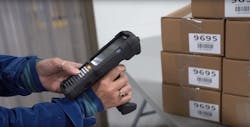Often when organizations embrace new technology, the goal is to realize a new competitive advantage or improve the bottom line. However, some technology deployments serve a far more altruistic purpose. Consider, for instance, the new technology helping the visually impaired workers at North Central Sight Services (NCSS), a manufacturer that provides employment opportunities to the blind and visually impaired.
NCSS’s mission is to provide exceptional products, services and employment opportunities to the blind and visually impaired. The organization employs 29 visually impaired workings including its CEO, and it needed a flexible platform to accommodate worker needs. NCSS workers count, package and ship AbilityOne office supplies, flash drives, labels and CD/DVD packs as part of a program under the U.S. AbilityOne Commission.
Addressing impairments
The visual impairment creates challenges when using non-adapted computing tools in the warehouse environment, explains Joe Tosolt, president of CSSI Technologies, a Zebra registered independent software vendor. “For this reason, CSSI worked with NCSS to create a set of screens specially adapted for the users. We selected large fonts and carefully chose colors to provide plenty of contrast. The NCSS team found these adapted screens on the Zebra MC3300 to be much easier to use,” he says.
Integrating CSSI's warehouse management solution (WMS) with Zebra’s Android-based mobile system made the most sense because NCSS also needed to transition away from Windows CE as technical support ends in 2020. In addition to using large characters and color coding, CSSI added voice-directed picking to further help employees succeed in challenging environments.
“The solution has helped us modernize our warehouse from a manual-based process to an automated one that has increased worker productivity and picking accuracy which has led to the near elimination of returns,” said Terri Kio, NCSS industry operations manager. “Working with companies like Zebra and CSSI who are committed to helping visually impaired staff has made a measurable difference in our business with the technology and by making our staff feel supported in their careers.”
Personal connection
Zebra’s Global Director of User Experience Design, James Morley-Smith, has been instrumental in company’s purpose-driven design philosophy. He found inspiration with his son Fintan, who lost his sight when he was very young due to cancer. By watching how Fintan adapted to his environment without his sight, Morley-Smith realized that warehouse workers might face similar challenges – dimly lit conditions and protective goggles that impair their vision while they work. He drew on this experience in designing tools for these front-line workers, developing larger buttons and other design modifications that compensate for the harsh warehouse environment and help the users perform their jobs better and with fewer risks for error.
“The biggest lesson reinforced here is that we need to keep the voice and needs of the customer in front of us,” says Tosolt. “In this case, by involving NCSS throughout the project, we were able to create a winning solution with NCSS, CSSI and Zebra.”
About the Author
Peter Fretty
Technology Editor
As a highly experienced journalist, Peter Fretty regularly covers advances in manufacturing, information technology, and software. He has written thousands of feature articles, cover stories, and white papers for an assortment of trade journals, business publications, and consumer magazines.


